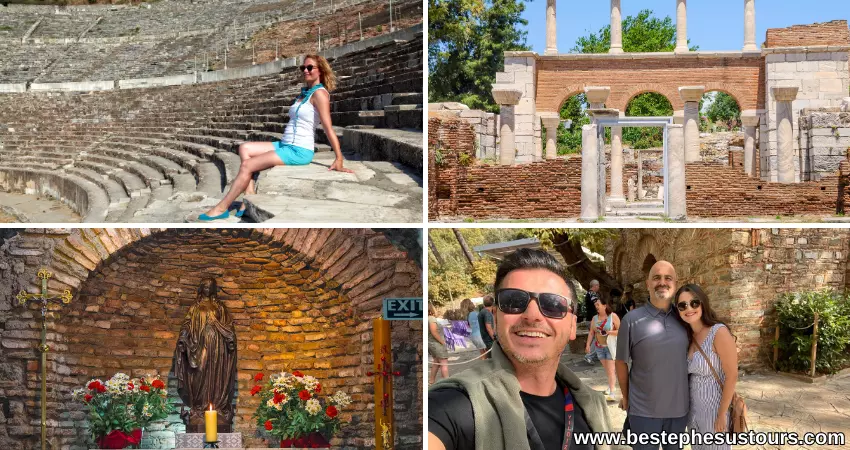
Introduction
If you’re interested in learning more about the biblical significance of Ephesus and the unique experience of taking a Biblical Ephesus tour, you’ve come to the right place. In this article, we’ll dive into the rich history of this ancient city and explore how its story is intertwined with that of early Christianity. We’ll also discuss what you can expect on a Biblical Ephesus tour and provide some helpful tips for preparing for your journey. So let’s get started!
Table of contents
Historical Background of Ephesus

The Founding of Ephesus
Ephesus, (Modern name Selcuk) located in the westernmost part of today’s Turkey, on the shores of the Aegean region, was an important city in the ancient world. If we ignore prehistoric Ephesus (B.C. 7000) it was founded by the Greeks (by Androclos the son of the king of Athens Kodros) in the 10th century BC, it was later dominated by the Romans and became an important commercial and cultural center. The city’s strategic location on the Aegean coast made it a crucial center for trade and communication across the Mediterranean.
See Also; The History of Ephesus
Ephesus in the New Testament
Ephesus played a prominent role in the New Testament, as it was a key center of early Christianity. It was visited by several prominent figures from the Bible, including the Apostle Paul, John the Apostle, and possibly even the Virgin Mary.
Biblical Significance of Ephesus

Paul’s Visiting in Ephesus
The Apostle Paul visited Ephesus during his second and third missionary journeys. He spent over two years in the city, preaching the gospel and establishing a vibrant Christian community. It was in Ephesus that Paul encountered the silversmiths who crafted idols of the goddess Artemis, leading to a riot as the new Christian faith threatened their livelihood.
Silversmith Demetrius of Ephesus Riot
Christianity was rapidly gaining popularity in Ephesus. The goldsmith Demetrius and others, who made a living by making and selling the silver statues of Artemis, were quite disturbed by the popularity of this new religion. Because the decrease in importance to Artemis would reduce its sales. Thousands of people provoked by Demetrius and his friends gathered in the Ephesus theater and started shouting “Ephesus Artemis is Supreme” and they caused great chaos.
In the midst of chaos, St. Paul’s friends dragged Gaius and Aristarchus to the theatre. Saint Paul wanted to appear in front of the crowd, but those around him wouldn’t let him. Finally, the officer in charge of the city’s security came and dispersed the crowd and announced to those who were caught that the courts were open for those who complained.

The Apostle John and Ephesus
The Apostle John is also believed to have spent time in Ephesus, possibly even living there until his death. According to tradition, he brought the Virgin Mary with him, and they both resided in the city for several years. St. John built a house on top of Bulbul Mountain near Ephesus because he thought it would be safer for Virgin Mary. This is the house that is visited as the House of the Virgin Mary today. This led to the belief that Ephesus was the final home of both St. John and the Virgin Mary, further contributing to the city’s biblical significance.
The Letter to the Ephesians
The biblical book of Ephesians is a letter written by the Apostle Paul to the Christian community in Ephesus. This epistle emphasizes the unity of all believers in Christ and provides guidance on living a godly life. The letter’s teachings continue to inspire Christians today, serving as a testament to the enduring impact of Ephesus on early Christianity.
The Church of Ephesus in Revelation
In the book of Revelation, the Church of Ephesus is one of the seven churches to which Jesus sends a message through John the Apostle. The message commends the Ephesian church for its perseverance and discernment but also warns them to return to their first love – their passion for Christ and his teachings. This message serves as a reminder of the importance of maintaining spiritual fervor and staying true to the core tenets of Christianity.

Ephesus is one of the Seven Churches of Revelation
Another essential aspect of the biblical significance of Ephesus is its status as one of the Seven Churches of Revelation. These seven churches, (Ephesus, Smyrna, Pergamum, Thyatira, Sardis, Philadelphia, and Laodicea) mentioned in the book of Revelation (Dated A.D. 95), were early Christian communities located in the region of Asia Minor, which is present-day Turkey. Each church received specific letters from John the Apostle. See Also; Christianity in Ephesus
The Ecumenical Council of Ephesus
The Ecumenical Council of Ephesus, held in AD 431, is another crucial event in the city’s rich Christian history. This council was the third ecumenical council convened by the early Christian Church, bringing together bishops from across the Christian world to discuss and settle key theological matters.
The primary focus of the Council of Ephesus was the debate surrounding the nature of Jesus Christ and his relationship with the Virgin Mary. The council ultimately proclaimed Mary as the “Theotokos” or “God-bearer,” affirming the belief that Jesus was both fully human and fully divine. This decision played a significant role in shaping Christian doctrine and defining the Church’s understanding of the nature of Jesus. See Also; Third Ecumenical Council of Ephesus
Highlights of Biblical Ephesus Tours

Ephesus Ancient City
The Ancient City of Ephesus offers a glimpse into the lives of the first Christians with its important sites such as the Great Theatre, the Church of Mary, and the ancient agora. Walking through this well-preserved city allows you to connect with its biblical significance and role in the growth of Christianity. As you wander the streets of Ephesus, you will be transported back in time by your guide’s narration to the days when the Apostle Paul walked these paths and preached the gospel.
See Also; Christianity in Ephesus, History of Ephesus
The House of the Virgin Mary
The House of the Virgin Mary is a significant pilgrimage site for Christians (Also a sacred place for Muslims) and is believed to be the final home of the Virgin Mary. Located on Mount Bulbul, just a short distance from the ancient city of Ephesus, this humble stone house is a peaceful and sacred place. The Apostle John is said to have brought Mary to Ephesus after the crucifixion of Jesus, and it is believed that she spent her final years here. Today, the site is visited by thousands of pilgrims and tourists each year, who come to pay their respects and experience the serene atmosphere.
See Also; The History of the House of the Virgin Mary The House of the Virgin Mary Guide
The Basilica of St. John
The Basilica of St. John, also known as St. John’s Church, was built in the 6th century to commemorate the burial site of the Apostle John. Although now in ruins, the site remains an important landmark in the history of Christianity and offers stunning panoramic views of the surrounding region. During a Biblical Ephesus tour, a visit to the Basilica of St. John provides a deeper connection to the life and ministry of this beloved apostle. Both the House of the Virgin Mary and the Basilica of St. John holds great spiritual and historical significance, making them must-see destinations for anyone interested in the early days of Christianity and the lives of its key figures.
See Also; The Basilica of St. John

The Temple of Artemis
One of the Seven Wonders of the Ancient World, the Temple of Artemis was a massive structure dedicated to the goddess Ephesian Artemis. Although only a few remnants of the original temple remain, its historical significance and connection to the biblical story of Paul make it a must-see site in Ephesus.
See Also; The Temple of Artemis at Ephesus
The Great Theater of Ephesus
The Great Theater of Ephesus, which could accommodate up to 25,000 spectators, is an awe-inspiring structure. It was in this theater that the riot initiated by the silversmiths took place, as recorded in the book of Acts. Today, visitors can sit on the ancient stone seats and imagine the dramatic events that unfolded here nearly two millennia ago.
See Also; The Great Theater of Ephesus
The Church of Mary in Ephesus
Also known as the Basilica of St. Mary, this ancient church is believed to be one of the earliest Christian places of worship in Ephesus. It is said that the third ecumenical council, which took place in AD 431, was held in this church. The ruins of the church serve as a testament to the long-standing Christian presence in Ephesus.
See Also; The History of the Church of Ephesus
Biblical Ephesus Tours

Why Join a Biblical Ephesus Tours?
A Biblical Ephesus tour offers a unique opportunity to walk in the footsteps of biblical figures and gain a deeper understanding of the city’s spiritual heritage. Guided Ephesus tours are led by knowledgeable experts who provide invaluable insights into the history, archaeology, and biblical significance of Ephesus.
What to Expect on a Tour?
During a Biblical Ephesus tour, you’ll explore the city’s most important sites, such as the Temple of Artemis, the Library of Celsus, the Great Theater, and the Church of Mary. Your guide will share fascinating stories and historical context, helping you to fully appreciate the significance of these ancient landmarks.
Biblical Ephesus Tours Company Recommendation
Best Ephesus Tours

Best Ephesus Tours
URL: https://www.bestephesustours.com

Conclusion
The biblical significance of Ephesus, along with its fascinating history and well-preserved ruins, make it a must-visit destination for anyone interested in early Christianity and ancient history. A Biblical Ephesus tour will deepen your understanding of this remarkable city and its role in shaping the Christian faith. We hope this article has inspired you to embark on your own journey to this incredible place!
FAQs
The duration of a Biblical Ephesus Tour can vary depending on the itinerary and the specific sites included in the tour. Generally, a comprehensive tour will last for a full day, while shorter tours cover all the highlights of the tour.
Yes, you can visit Ephesus independently without joining a tour. However, a guided tour provides the advantage of expert knowledge and insights, which can significantly enhance your understanding of the city’s biblical significance and historical context.
In addition to Ephesus, Turkey is home to numerous other biblical sites, including the cities of Laodicea, Hierapolis, and Pergamum. These locations also played important roles in early Christianity and are well worth a visit if you have the time and interest.
Absolutely! Turkey is a country rich in history, culture, and natural beauty. In addition to Ephesus, you can explore the fascinating city of Istanbul, the unique landscapes of Cappadocia, and the stunning Mediterranean coastline. Turkey offers a wide range of experiences for every traveler to enjoy.
When participating in a Biblical Ephesus Tour, it is important to dress appropriately for the weather, wear comfortable walking shoes, and bring essential items such as water, sunscreen, and a hat. However there is no restriction on it, modest clothing is recommended for visiting biblical sites.
A Biblical Ephesus Tour typically includes several key attractions that are significant to the history of Christianity. Some of the most notable sites include the Ephesus Ancient City, The Basilica of St. John, The House of the Virgin Mary, and The Temple of Artemis.






